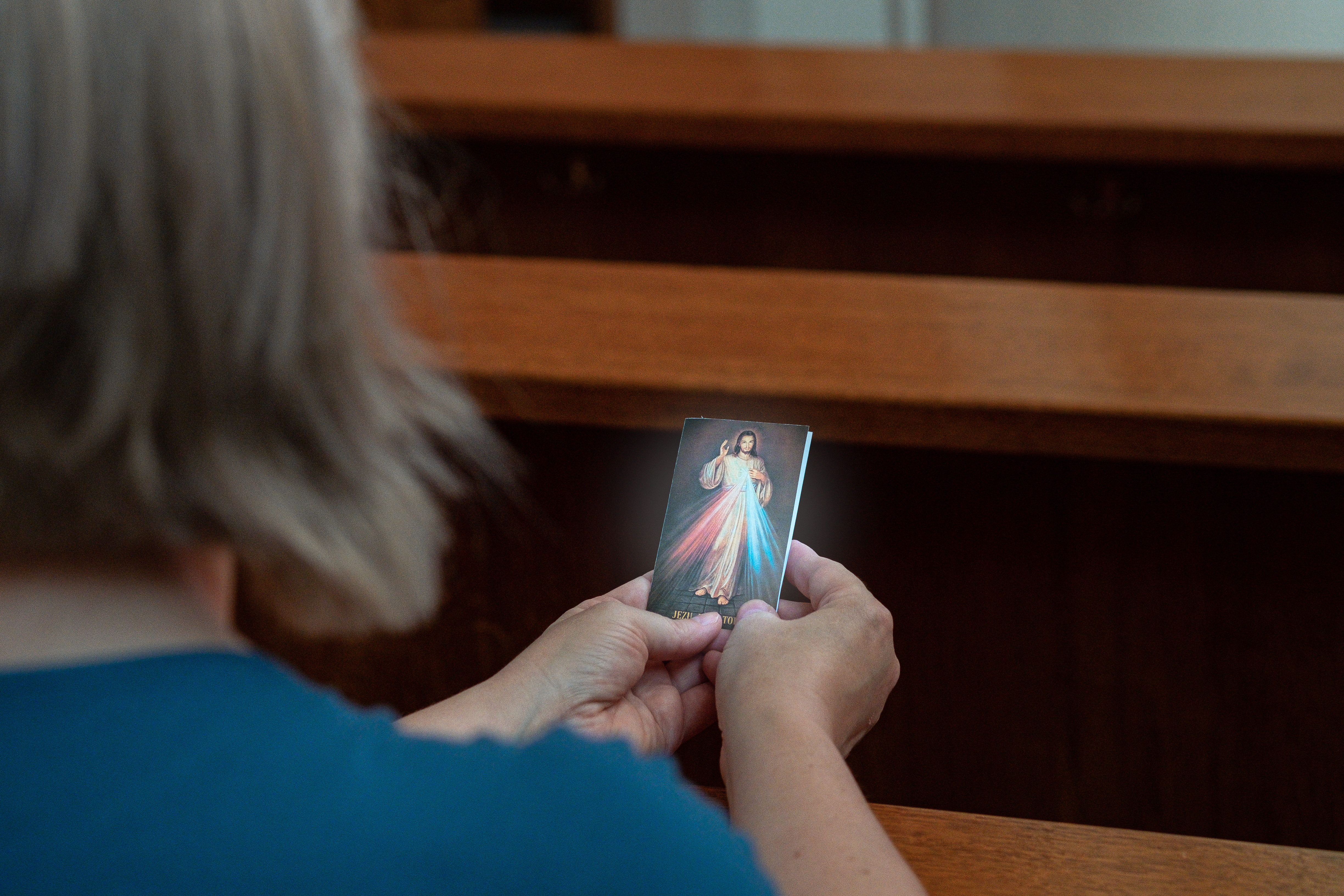Our Gospel today is brief, merely four verses. And yet, with so few words, Matthew can tell us so much about who Jesus is and the way we ought to relate to Him. The leper (who we know nothing about), shows us in one line the proper posture we should have in prayer. Let’s look closely at what he says to Jesus.
First, the leper addresses Jesus as, “Lord.” In the Greek, Lord is Kyrios. In Hebrew, Adonai. Adonai is the spoken word used when the Jewish people wish to refer to God’s most sacred name, the unutterable YHWH as it appears in Scripture. To call Jesus Lord, Kyrios, Adonai, is to say that Jesus is God. In this single word of faith, the leper is announcing who Jesus is.
“If you wish,” follows the leper’s initial statement of faith. Something we have tried to teach our children is that when it comes to sharing, “The giver chooses when to share.” The person who desires the toy, book, turn, etc. is the one who has to wait. The giver, the one relinquishing the object in question, gets to decide when it is time to share. Now of course, we do insist that the giver be reasonable and not claim their turn will be over tomorrow. But to bring it back to the leper and Jesus, the leper is not demanding that Jesus heal him. He places the timing in Jesus’ hands. “If you wish” – at some point, someday, perhaps today, or perhaps not. It is Jesus’ choice.
“You can make me clean.” The leper has complete confidence in Jesus’ ability to heal him. While still showing deference to Jesus’ authority and will, the leper still boldly states what he most desires from Jesus. Jesus wants us to be bold in our requests. Jesus tells us to “knock and the door will be opened to you” (Matthew 7:7). If we do not muster the courage to knock, we won’t know what Jesus is waiting to give us behind the door of our desire.
We believe in a God of the impossible. Scripture is full of stories where God shows up and does the impossible. Jesus, in His very person as the Incarnation, is seemingly the impossible. But with God, all things are possible. Why try to limit Him with small requests. Be bold and brave in your prayers, just like the leper. At the same time, remember who you are asking these things of. God, the giver of all good, knows exactly what you need when you need it and He will not withhold it from you. We have to trust His goodness and timing with the same level of boldness that we ask things of Him.
El Evangelio de hoy es breve, apenas cuatro versículos. Y, sin embargo, con tan pocas palabras, Mateo puede decirnos mucho sobre quién es Jesús y la forma en que debemos relacionarnos con Él. El leproso (de quien no sabemos nada), nos muestra con una sola frase la postura adecuada que debemos tener en la oración. Miremos de cerca lo que le dice a Jesús.
Primero, el leproso se dirige a Jesús como “Señor”. En griego, “Señor” es Kyrios. En hebreo, Adonai. Adonai es la palabra hablada que se utiliza cuando el pueblo judío desea referirse al nombre más sagrado de Dios, el inefable Yahvé tal como aparece en las Escrituras. Llamar a Jesús Señor, Kyrios, Adonai, quiere decir que Jesús es Dios. En esta única palabra de fe, el leproso anuncia quién es Jesús.
“Si quieres”, sigue la declaración de fe inicial del leproso. Algo que hemos tratado de enseñar a nuestros hijos es que cuando se trata de compartir, “el dador elige cuándo compartir”. La persona que desea el juguete, libro, turno, etc. es la que tiene que esperar. El donante, el que renuncia al objeto en cuestión, decide cuándo es el momento de compartirlo. Ahora, por supuesto, insistimos en que el donante sea razonable y no afirme que su turno terminará mañana. Pero regresando al leproso y a Jesús, el leproso no exige que Jesús lo sane. Pone el momento en las manos de Jesús. “Si quieres”, en algún momento, algún día, quizás hoy o quizás no. Es decisión de Jesús.
“Puedes curarme”. El leproso tiene plena confianza en la capacidad de Jesús para curarlo. Aunque muestra deferencia hacia la autoridad y la voluntad de Jesús, el leproso todavía declara con valentía lo que más desea de Jesús. Jesús quiere que seamos audaces en nuestras peticiones. Jesús nos dice que “toca y se les abrirá la puerta” (Mateo 7,7). Si no tenemos el valor de tocar, no sabremos lo que Jesús espera darnos detrás de la puerta de nuestro deseo.
Creemos en un Dios de lo imposible. Las Escrituras están llenas de historias en las que Dios aparece y hace lo imposible. Jesús, en Su misma persona como Encarnación, es aparentemente lo imposible. Pero con Dios todo es posible. ¿Por qué intentar limitarlo con pequeñas peticiones? Sé audaz y valiente en tus oraciones, como el leproso. Al mismo tiempo, recuerda a quién le estás pidiendo estas cosas. Dios, el dador de todo bien, sabe exactamente lo que necesitas cuando lo necesitas y no te lo negará. Tenemos que confiar en su bondad y su oportunidad con el mismo nivel de audacia con el que le pedimos las cosas.
 Kate Taliaferro is an Air Force wife and mother. She is blessed to be able to homeschool, bake bread and fold endless piles of laundry. When not planning a school day, writing a blog post or cooking pasta, Kate can be found curled up with a book or working with some kind of fiber craft. Kate blogs at DailyGraces.net.
Kate Taliaferro is an Air Force wife and mother. She is blessed to be able to homeschool, bake bread and fold endless piles of laundry. When not planning a school day, writing a blog post or cooking pasta, Kate can be found curled up with a book or working with some kind of fiber craft. Kate blogs at DailyGraces.net.
Feature Image Credit: Lukas, www.pexels.com/photo/person-hand-reaching-body-of-water-296282/


 Tami Urcia grew up in Western Michigan, a middle child in a large Catholic family. She spent early young adulthood as a missionary in Mexico, studying theology and philosophy, then worked and traveled extensively before finishing her Bachelor’s Degree in Western Kentucky. She loves tackling projects, finding fun ways to keep her little ones occupied, quiet conversation with the hubby and finding unique ways to love. She works full time at Diocesan, is a guest blogger on
Tami Urcia grew up in Western Michigan, a middle child in a large Catholic family. She spent early young adulthood as a missionary in Mexico, studying theology and philosophy, then worked and traveled extensively before finishing her Bachelor’s Degree in Western Kentucky. She loves tackling projects, finding fun ways to keep her little ones occupied, quiet conversation with the hubby and finding unique ways to love. She works full time at Diocesan, is a guest blogger on 
 Emily Jaminet is a Catholic author, speaker, radio personality, wife, and mother of seven children. She earned a bachelor’s degree in mental health and human services from the Franciscan University of Steubenville. She is the co-founder of
Emily Jaminet is a Catholic author, speaker, radio personality, wife, and mother of seven children. She earned a bachelor’s degree in mental health and human services from the Franciscan University of Steubenville. She is the co-founder of 
 Kathryn Mulderink, MA, is married to Robert, Station Manager for Holy Family Radio. Together they have seven children (including Father Rob), and eight grandchildren. She is President of the local community of Secular Discalced Carmelites and has published five books and many articles. Over the last 30 years, she has worked as a teacher, headmistress, catechist, Pastoral Associate, and DRE, and as a writer and voice talent for Catholic Radio. Currently, she serves the Church by writing and speaking, and by collaborating with various parishes and to lead others to encounter Christ and engage their faith. Her website is
Kathryn Mulderink, MA, is married to Robert, Station Manager for Holy Family Radio. Together they have seven children (including Father Rob), and eight grandchildren. She is President of the local community of Secular Discalced Carmelites and has published five books and many articles. Over the last 30 years, she has worked as a teacher, headmistress, catechist, Pastoral Associate, and DRE, and as a writer and voice talent for Catholic Radio. Currently, she serves the Church by writing and speaking, and by collaborating with various parishes and to lead others to encounter Christ and engage their faith. Her website is 
 Deacon Dan Schneider is a retired general manager of industrial distributors. He and his wife Vicki have been married for over 50 years. They are the parents of eight children and thirty-one grandchildren. He has a degree in Family Life Education from Spring Arbor University. He was ordained a Permanent Deacon in 2002. He has a passion for working with engaged and married couples and his main ministry has been preparing couples for marriage.
Deacon Dan Schneider is a retired general manager of industrial distributors. He and his wife Vicki have been married for over 50 years. They are the parents of eight children and thirty-one grandchildren. He has a degree in Family Life Education from Spring Arbor University. He was ordained a Permanent Deacon in 2002. He has a passion for working with engaged and married couples and his main ministry has been preparing couples for marriage.
 Susan Ciancio has a BA in psychology and a BA in sociology from the University of Notre Dame, with an MA in liberal studies from Indiana University. For the past 19 years, she has worked as a professional editor and writer, editing both fiction and nonfiction books, magazine articles, blogs, educational lessons, professional materials and website content. Thirteen of those years have been in the pro-life sector. Currently Susan freelances and writes weekly for HLI, edits for American Life League, and is the executive editor of Celebrate Life Magazine. She also serves as executive editor for the Culture of Life Studies Program—an educational nonprofit program for K-12 students. You can reach her at
Susan Ciancio has a BA in psychology and a BA in sociology from the University of Notre Dame, with an MA in liberal studies from Indiana University. For the past 19 years, she has worked as a professional editor and writer, editing both fiction and nonfiction books, magazine articles, blogs, educational lessons, professional materials and website content. Thirteen of those years have been in the pro-life sector. Currently Susan freelances and writes weekly for HLI, edits for American Life League, and is the executive editor of Celebrate Life Magazine. She also serves as executive editor for the Culture of Life Studies Program—an educational nonprofit program for K-12 students. You can reach her at 

 Mike Karpus is a regular guy. He grew up in Michigan’s Upper Peninsula, graduated from Michigan State University and works as an editor. He is married to a Catholic school principal, raised two daughters who became Catholic school teachers at points in their careers, and now relishes his two grandchildren, including the older one who is fascinated with learning about his faith. He also has served on a Catholic school board, a pastoral council and a parish stewardship committee. He currently is a lector at Mass, a Knight of Columbus, Adult Faith Formation Committee member and a board member of the local Habitat for Humanity organization. But mostly he’s a regular guy.
Mike Karpus is a regular guy. He grew up in Michigan’s Upper Peninsula, graduated from Michigan State University and works as an editor. He is married to a Catholic school principal, raised two daughters who became Catholic school teachers at points in their careers, and now relishes his two grandchildren, including the older one who is fascinated with learning about his faith. He also has served on a Catholic school board, a pastoral council and a parish stewardship committee. He currently is a lector at Mass, a Knight of Columbus, Adult Faith Formation Committee member and a board member of the local Habitat for Humanity organization. But mostly he’s a regular guy.


 A lover of Jesus Christ, a wife, and a mother of five,
A lover of Jesus Christ, a wife, and a mother of five, 